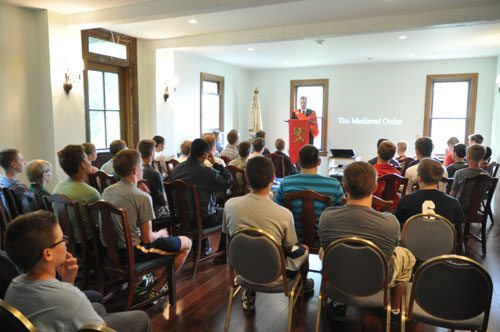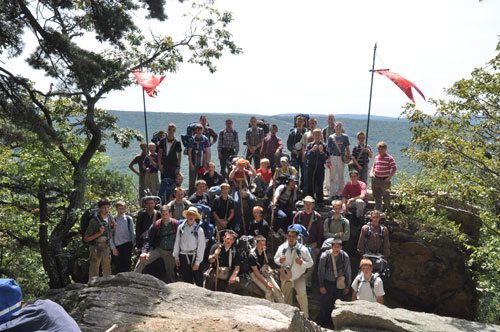 The eleven-day TFP Call to Chivalry Summer Course was not your average summer camp. The camp invited over forty young men to take up the banner of purity and self-discipline through the examples of the saints and heroes of Poland and Lithuania. The participants played field games to instill in them a sense of chivalry towards one another, and to show them that teamwork is needed for success. They also went on outings to help develop a sense of the world around them, and to give them an historical sense.
The eleven-day TFP Call to Chivalry Summer Course was not your average summer camp. The camp invited over forty young men to take up the banner of purity and self-discipline through the examples of the saints and heroes of Poland and Lithuania. The participants played field games to instill in them a sense of chivalry towards one another, and to show them that teamwork is needed for success. They also went on outings to help develop a sense of the world around them, and to give them an historical sense.
Informative Talks for Young Men
“My favorite part was being around pure young men like myself. It was inspiring… and the talks gave me inspiration” — Joseph Becker, camp participant.
Among the many Catholic heroes mentioned in the talks, there was one who is an example for our times. His name is Saint Maximilian Kolbe. He lived a life of heroic virtue during a time when the Church was especially persecuted. His life spanned World War I and ended in the Nazi concentration camp of Auschwitz as a martyr.
The example of Saint Maximilian is especially pertinent in our times as the government of the United Sates has made moves to hinder the freedom of the Church. Even under persecution Father Kolbe wrote articles against socialism and communism and distributed his magazine to over one million Poles.

Along with the talks about such Polish heroes as King Jan Sobieski, Saint Andrew Bobola and many other great leaders, a talk was given on the four last things: death, judgment, heaven and hell. Saint Alphonsus said that if a man kept the four last things constantly in his mind, more would be saved.
This year’s camp had an added bonus that other camps have not had. Mr. Maciej Maliczek, a TFP member from Poland, came and gave a presentation on the Siege of Jasna Gora. It is one thing to hear a talk, but quite another to hear it from a person who’s life is affected by the events of which he speaks.
To add to the Medieval character of the camp, two men were invited who had expertise in some of the arts of the Middle Ages. Mr. Roark Mitzell gave a two-hour demonstration on the history of swordplay in the West. He ended his presentation with a jug cutting session, a hands-on demonstration of some of the topics covered during the talk.
In addition to the sword demonstration was a presentation on another art that is practiced very little in our day: the art of falconry. Mr. Michael Dupuy, an expert, came and showed the boys some of the intricacies of the art and gave the participants an admiration for the skills that our ancestors helped to develop during the Middle Ages.
Activities That Form Catholic Men
“I liked learning of the chivalry of the saints and how I can be chivalrous” — Isaac Lind, camp participant.
Among the many activities of the camp, some stand out for their usefulness in forming Catholic men. One of the best ways to provide a challenge to body and spirit is an overnight hike in the mountains. The boys carried tents, sleeping bags, and all that was needed to cook meals, plus their enthusiasm. As night fell and camp was set, the smell of well-seasoned campfire steak wafted in the air and the boys gathered around to pray grace. Then, a story about African big game hunting was read as the orange glow of embers cast a faint and flickering light over the crowd of enthralled youths.

The next day, a hearty breakfast greeted the young campers and prepared them for the long 13-mile trek to the other side of the mountain. It was unforgettable.
Another activity for the participants was a high ropes course that supplied a very special type of challenge. Climbing a thirty foot rock wall is not an easy task, especially when one of your fears is that of heights. Once again, the young men were presented obstacles to overcome as a preparation for the difficulties faced in life. The zip line, cargo net, rock walls, and Burma Bridge were challenges that had to be overcome with the protection of a safety line. The problems faced in life are not necessarily as dangerous as climbing a mountain, but they definitely do not have safety ropes attached to them. This was a way for the camp participants to conquer their fears in a safe environment.
Great Expectations
The Call to Chivalry camp came to an end with the tradition of a Medieval Banquet and the giving of mementos. The days were filled with talks, games and activities that made the time pass very quickly. Many of the boys expressed the wish to go to attend St. Louis de Montfort Academy for the upcoming school year and all could not wait to return for next year’s camp.
Everyone left the camp with the happy thought that forty young men were instilled with the spirit of chivalry, and now know how to concretely apply it in their daily lives. The Call to Chivalry camp ensures that chivalry does not die, but rather lives on in the souls of the participants that arrive looking for heroism, and leave that much closer to their ideal.
